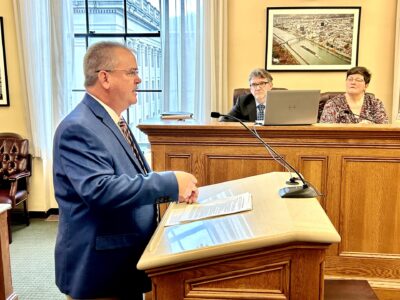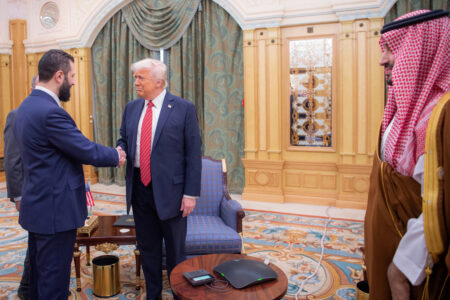Medicaid Fraud Control Unit Sees Successes, W.Va. AG’s Office Says

photo by: Steven Allen Adams
Senior Deputy Attorney General Brent Wolfingbarger briefs members of the Post Audit Subcommittee during a legislative interim meeting Sunday at the Capitol in Charleston.
CHARLESTON — The transfer of West Virginia’s Medicaid Fraud Control Unit to Attorney General Patrick Morrisey has seen substantial increases in investigations and convictions.
Members of the West Virginia Legislature’s Post Audit Subcommittee received a report Sunday afternoon on the performance of the state’s Medicaid Fraud Control Unit on the first day of three-day September legislative interim meetings at the State Capitol Building.
The Medicaid Fraud Control Unit (MFCU) is a division of the Attorney General’s Office. The MFCU was transferred to Attorney General Patrick Morrisey in 2019 after previously being managed by the Office of Inspector General within the state Department of Health and Human Resources.
Senate Bill 318, passed by the Legislature in 2019, required a study of the MFCU, comparing the management of the program by the Attorney General’s Office between fiscal years 2020 and 2022 to the final three years of the program under DHHR.
According to Sunday’s report, fraud referrals increased from 335 cases between years 2017 and 2019 to DHHR to 529 cases referred to the Attorney General’s Office between 2020 and 2022 – a 57.9% increase. Total cases opened from referrals increased by 145.7% during the same time frame, from 138 cases under DHHR to 339 cases under the Attorney General’s Office.
The number of fraud and abuse/neglect cases referred for prosecution jumped by 42.1% during the compared periods, from 38 cases under DHHR to 54 cases under Morrisey. The number of convictions for fraud and abuse/neglect cases jumped by 142.9%, from 14 cases under DHHR to 34 cases under Morrisey. The total recovery orders from civil and criminal cases increased by 176.2%, from more than $27 million under DHHR to more than $75 million under the Attorney General’s Office.
“I would say that the AGO (Attorney General’s Office) was pleased by the report and that the (Legislative Auditor’s Office) recognized the various operational changes the AGO had implemented, resulted in significant improvements across measurable outcomes when compared to how the MFCU did under DHHR,” said Brent Wolfingbarger, senior deputy attorney general.
The MFCU investigates alleged fraud of the state’s Medicaid program by health care providers. It also investigates criminal abuse and neglect complaints against Medicaid-funded healthcare facilities and allegations of misappropriation of private patient funds by Medicaid-funded facilities. MFCU does not investigate beneficiary fraud.
The unit was expanded at the end of 2022 to include investigations of the federal Children’s Health Insurance Program (CHIP). The MFCU must be recertified annually by the U.S. Department of Health and Human Services.
“It’s always good to have a report where the Legislature put this in place and the (Attorney General’s) Office has implemented it in such a way that it seems to be yielding positive results,” said Senate President Craig Blair, R-Berkeley.
Medicaid provides health coverage to low-income individuals, families, children, seniors, and people with physical, intellectual, and developmental disabilities. In West Virginia, Medicaid funding in fiscal year 2022 was $4.4 billion, including $3.1 billion in federal tax dollars, with more than 33% of West Virginians covered by Medicaid.
More than 634,000 West Virginians are covered by Medicaid and the CHIP as of May. But with the COVID-19 federal emergency ending in March, approximately 104,000 West Virginians have lost coverage due to required redeterminations of eligibility, according to the Kaiser Family Foundation. Of those disenrollments, 33% were children.
House Speaker Roger Hanshaw, R-Clay, asked Wolfingbarger whether the increase in cases was related to the increase in enrollees to Medicaid during the COVID-19 federal emergency, with healthcare providers taking advantage of the influx to engage in scams.
“Actually, no. I’d say the reverse is true,” Wolfingbarger said. “We’ve seen some of the cases, particularly the ones that we work with our federal counterparts on, had ongoing delays, so to speak due to some of the limitations that were put in place during the coronavirus pandemic.”
He continued, “For instance, if there were witnesses that were in nursing homes that we needed to interview, a lot of times our investigators couldn’t even gain access to the facilities due to all of the shutdowns. The success that we’ve made over the last three years was despite those restrictions.”
Wolfingbarger told Del. Kayla Young, D-Kanawha, that the MFCU works on outreach to local law enforcement and county prosecutors, as well as proactive outreach to healthcare providers on what the unit does. The MFCU also works closely with DHHR’s Bureau for Medical Services to comb through data to identify potential fraud.
Wolfingbarger said the Legislature could consider granting the MFCU the ability to levy civil penalties against providers as a means of leverage, as well removing language from state abuse and neglect laws that limit the kinds of cases that the MFCU can bring against providers.
“I’d like to explore this further to see whether we can put legislation together to be able to make it so that we’ve got better outcomes,” Blair said.





